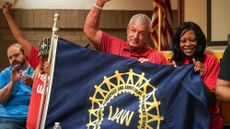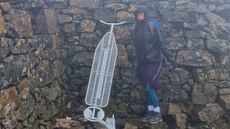‘Scotland’s political culture is in a dire state’
Your digest of analysis and commentary from the British and international press

- 1. Now, more than ever, the PM must hold firm on refusing a Scottish independence referendum
- 2. Boris Johnson has double standards on the IRA
- 3. The pandemic has laid bare the social care crisis as never before
- 4. Rishi’s nightmare: will inflation crush the recovery?
- 5. Irish outrage at Pontins obscures the truth about anti-Traveller racism
1. Now, more than ever, the PM must hold firm on refusing a Scottish independence referendum
Henry Hill in The Telegraph
on the Salmond inquiry
The scandal unfolding in Holyrood over the Scottish government’s botched attempts to deal with sexual harassment accusations against Alex Salmond has revealed “a political culture in a dire state”, says Henry Hill in The Telegraph. A skilful performance from First Minister Nicola Sturgeon at Wednesday’s inquiry means “it seems unlikely… that the chaos will lead to the immediate downfall of the first minister”. But to ensure the health of the union, Boris Johnson must refuse a referendum, forcing the question of independence “beyond Sturgeon’s time in office” and thus negating her “unique connection to Scottish voters”.
Subscribe to The Week
Escape your echo chamber. Get the facts behind the news, plus analysis from multiple perspectives.

Sign up for The Week's Free Newsletters
From our morning news briefing to a weekly Good News Newsletter, get the best of The Week delivered directly to your inbox.
From our morning news briefing to a weekly Good News Newsletter, get the best of The Week delivered directly to your inbox.
2. Boris Johnson has double standards on the IRA
David Aaronovitch in The Times
on historic admissions
Roy Greenslade, the former editor of the Daily Mirror and a journalism ethics professor, revealed he was a silent supporter of the Provisional IRA in an “unrepentant admission” featured in the British Journalism Review this week, writes David Aaronovitch in The Times. “Yet,” says Aaronovitch, “such is the character of the prime minister that I couldn’t help wondering whether, had Greenslade become an enthusiastic Brexiteer late in his career, he might have avoided the condemnation and won instead a seat in the House of Lords.” That’s what happened last summer when Claire Fox, formerly of the Irish Freedom Movement, became Baroness Fox. “So IRA-supporting Greenslade is to be condemned but the even more IRA-supporting Fox is to be ennobled. And why?” asks Aaronovitch. “It’s simple: Johnson doesn’t care and he and his coterie don’t think you care either.”
3. The pandemic has laid bare the social care crisis as never before
Cathy Newman in The Independent
on a creaking system
“It’s getting on for two years since Boris Johnson stood outside Number Ten and promised, in his first speech as prime minister, to ‘fix the crisis in social care once and for all’,” writes Cathy Newman in The Independent. But so far “an ominous silence” has descended over those plans. The coronavirus crisis has revealed the scale of the social care crisis. “A lack of staff, years of underfunding and a fragmented system have all contributed to what they [those working within the sector] believe was a preventable tragedy,” Newman adds.
4. Rishi’s nightmare: will inflation crush the recovery?
Kate Andrews in The Spectator
on the spring budget
“At first” increasing corporation tax “seems to make no sense”, says Kate Andrew in The Spectator. “Britain is in the middle of the worst economic crash in recorded history, with a Chancellor who is famously keen on low taxes, spending control and sound money.” So why is Rishi Sunak increasing taxes on business? “The explanation most Tories comfort themselves with is that Sunak wants to explain to a high-spending Prime Minister that today’s cash splurge is tomorrow’s tax rise,” she says. But Sunak is “motivated by something else… not dreams of fiscal sanity… but nightmares… [about] an inflation resurgence that could crush Britain’s economic recovery”.
5. Irish outrage at Pontins obscures the truth about anti-Traveller racism
Seamas O’Reilly in The Guardian
on blatant discrimination
“I was well into my adult years when I realised a word that I… had been using as an insult was actually a name,” Seamss O’Reilly writes in The Guardian. “You could be called this word if you had scuffed trainers, or if your school uniform had gone a little threadbare.” It meant you were a “cheapskate, ingrate, reprobate and wretch”. He continues that he was reminded of the “power of that word” when news broke that holiday chain Pontins had a list of surnames that it banned from staying at its resorts. “We know that no one in Ireland is more Othered than members of the travelling community,” he adds.
Create an account with the same email registered to your subscription to unlock access.
Sign up for Today's Best Articles in your inbox
A free daily email with the biggest news stories of the day – and the best features from TheWeek.com
-
 Nigeria's worsening rate of maternal mortality
Nigeria's worsening rate of maternal mortalityUnder the radar Economic crisis is making hospitals unaffordable, with women increasingly not receiving the care they need
By Harriet Marsden, The Week UK Published
-
 'Elevating Earth Day into a national holiday is not radical — it's practical'
'Elevating Earth Day into a national holiday is not radical — it's practical'Instant Opinion Opinion, comment and editorials of the day
By Harold Maass, The Week US Published
-
 UAW scores historic win in South at VW plant
UAW scores historic win in South at VW plantSpeed Read Volkswagen workers in Tennessee have voted to join the United Auto Workers union
By Peter Weber, The Week US Published
-
 NHS tells Scots to walk like penguins
NHS tells Scots to walk like penguinsTall Tales Walk like penguins in the snow, says NHS
By Chas Newkey-Burden, The Week UK Published
-
 Woman solves 'rude neighbour' mystery
Woman solves 'rude neighbour' mysteryTall Tales And other stories from the stranger side of life
By Chas Newkey-Burden, The Week UK Published
-
 'Extreme ironing' blamed for Ben Nevis board
'Extreme ironing' blamed for Ben Nevis boardTall Tales And other stories from the stranger side of life
By Chas Newkey-Burden, The Week UK Published
-
 Screaming Beatles fans embarrassed George Harrison’s mother
Screaming Beatles fans embarrassed George Harrison’s motherfeature And other stories from the stranger side of life
By Chas Newkey-Burden Published
-
 First crocodile virgin birth recorded
First crocodile virgin birth recordedfeature And other stories from the stranger side of life
By Chas Newkey-Burden Published
-
 Joggers told to wear helmets amid bird terror
Joggers told to wear helmets amid bird terrorfeature And other stories from the stranger side of life
By Chas Newkey-Burden Published
-
 Otter accused of killing relocated Loch Lomond beavers
Otter accused of killing relocated Loch Lomond beaversSpeed Read The dead beaver kits were moved from Tayside to RSPB Scotland reserve last month
By The Week Staff Published
-
 Trans prisoners: a ‘conflict of rights’?
Trans prisoners: a ‘conflict of rights’?Talking Point Case of where to house trans woman convicted of rape causes uproar in Scotland
By The Week Staff Published